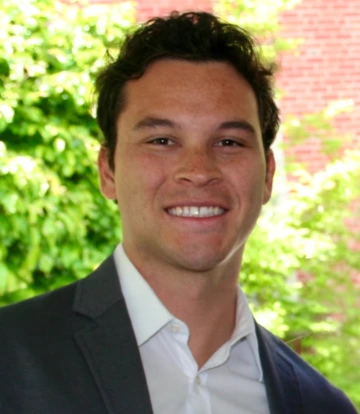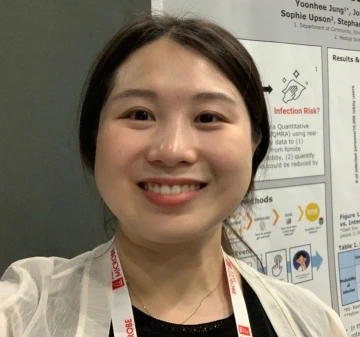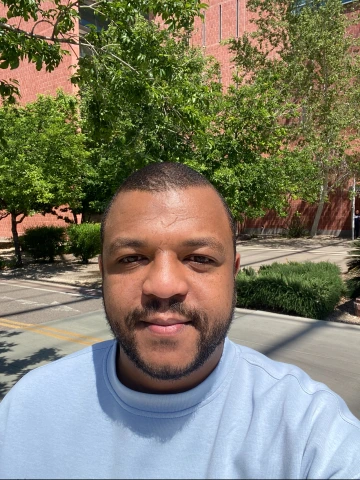Lance Picton, MPH
Graduate Research Associate – Environmental Health Sciences
Tucson, Arizona
mail_outline jackpicton@arizona.edu
Lance is a Ph.D. student in Environmental Health Sciences at the University of Arizona, where he also earned a Bachelor of Science in Microbiology and an MPH in Environmental and Occupational Health. During his graduate studies, he completed his research fellowship at the Johns Hopkins School of Medicine before returning to Arizona to pursue his doctoral work. He is currently working on projects investigating complex microbial communities and their interactions in various environmental contexts. He aims to perform microbiome and microbial dysbiosis analysis through advanced microbiological and genomic techniques, and hopes to continue his work in translating laboratory findings into real-world public health strategies.
Royani Saha, MS
Graduate Research Assistant – Environmental Health Sciences
Malda, India
mail_outline royanisaha@arizona.edu
Royani Saha is a Ph.D. student in Environmental Health Sciences at the University of Arizona. She holds an integrated Master’s in Medical Biotechnology from the Sikkim Manipal Institute of Medical Sciences in India. She is currently engaged in research projects that track pathogen movement and transmission in everyday environments to elucidate their propagation and broader disease dynamics while implementing real‑world interventions. She aims to leverage machine‑learning models by translating these environmental insights into actionable public‑health strategies for disease detection and prevention. Committed to clear science communication, Royani wishes to bridge benchside discoveries with bedside applications to protect and inform communities. She is also a part the SCORCH team, researching extreme‑heat prevention, and contributes to the GFV initiative, where she employs AI and machine learning methods to forecast ILI activity and refine wastewater‑surveillance-based anomaly detection.
Abby Cassius
Undergraduate Researcher – Microbiology
Memphis, Tennessee
mail_outline acassius@arizona.edu
Abby is an undergraduate student in Microbiology at the University of Arizona, where she is also pursuing minors in Veterinary Science and Environmental Science. Over the summer of 2024, she was able to participate in an Undergraduate Biology Research Program (UBRP), studying microbial transfer from dirty laundry to hands with the ESRAC lab. Additionally, over the summer of 2025, she will be participating in a Summer Research Scholars program at the University of Tennessee Health Sciences Center, studying fungal interactions with each other and the environment, and how these interactions impact host-pathogen and microbe-microbe interactions. She is currently working on completing her Honors Thesis and plans to continue onto a Masters Degree.

Harini Arumugam Gandhimathi
Undergraduate Researcher – Physiology/Medical Sciences
mail_outline harinia1@arizona.edu
Harini is an undergraduate student majoring in Physiology and Medical Sciences with an emphasis on Medical sciences and has a peaking interest in exposure assessment and public health research. As an undergraduate, she has worked on creating an engaging climate and health activity for the Tucson book of festival through ESRAC and SCORCH to create youth awareness for climate and health. Her research interests include infectious diseases, environmental microbial communities and extreme heat relief in Southern Arizona. She plans to graduate with her BS in May 2028 and pursue MD-MPH shortly after.

Yva Luc
Graduate Student – Environmental Health Sciences
mail_outline yluc@arizona.edu
Yva is a Ph.D. student in Environmental Health Sciences. She is originally from Haiti and has resided in Florida since moving to the United States. Yva earned her Bachelor of Science in Biomedical Sciences with a minor in Chemistry and a Master's in Pharmaceutical Nanotechnology. Yva is currently working as a Clinical Research Assistant at the College of Nursing. From her experience in clinical research at a hospital, Yva aims to focus her research on the effect of chronic smoking on respiratory infection, as well as the use of nanoparticles on bacterial and lung cell viability.
Hiroki Ando, ME
Graduate Student – Environmental Health Sciences
Tokyo, Japan
mail_outline hirokiando@arizona.edu
Hiroki is a Ph.D. student in Environmental Health Sciences at the University of Arizona. He earned both his Bachelor's and Master's degrees in Environmental Engineering from Hokkaido University in Japan. During his time there, he worked on developing detection methods for infectious disease viruses in wastewater to advance the practical application of wastewater-based epidemiology. His current research focuses on modeling wastewater surveillance data and expanding its use to monitor zoonotic and vector-borne diseases, integrating engineering methods with public health approaches. He aims to contribute to global health through interdisciplinary collaboration between environmental engineering and public health.
Yoonhee Jung, MS
Graduate Student – Environmental Health Sciences
mail_outline yoonheej@arizona.edu
Yoonhee Jung is a PhD candidate in Environmental Health Science at the University of Arizona. Her main research interests for her doctoral degree are Quantitative Microbial Risk Assessment (QMRA), exposure assessment, infectious disease transmission modeling, indoor environment, indoor air quality (IAQ), risk perception, and water treatment and disinfection. She studied water treatment and disinfection using advanced oxidation processes (AOP) for her Bachelor of Science and Master of Science in Environmental Engineering at Yonsei University, South Korea. Her aim is to make a better decision-making process that enhances emergency response to future pandemics or outbreaks through QMRA and assessment of the intervention effectiveness. As a risk assessor and exposure scientist, she hopes to continue working on the project to prevent pathogen transmissions and to reduce harmful chemical exposure to the public using appropriate interventions for the indoor environment.
Jumah Alkhaibari, MPH
Graduate Student – Environmental Health Sciences
Saudi Arabia
mail_outline alkhaibari@arizona.edu
Jumah Alkhaibari is a second-year PhD student in the Environmental Health Sciences program. He holds a bachelor’s degree in Medical Laboratory Technology (MLT) and a Master of Public Health (MPH), with hands-on experience at the King Hussein Cancer Center in Jordan and the Leon County Health Department in Florida. His research interests include environmental health, epidemiology, health disparities, and community well-being. He is currently working on a quantitative microbial risk assessment (QMRA) study in built environments. His passion is to be a researcher in food safety and hygienic practices.
Ahamed Ashraf, MS
Graduate Research Associate – Environmental Health Sciences
mail_outline ahamedashraf@arizona.edu
Ahamed Ashraf is pursuing a PhD in Environmental Health Sciences at the University of Arizona. He earned his MS and BSc in Public Health and Informatics from Jahangirnagar University in Bangladesh. He previously worked as a Data Management Assistant at Bangladesh's Institute of Epidemiology, Disease Control, and Research. Upon moving to the USA, he was a Graduate Research Associate focusing on QMRA modelling for SC Johnson & Son. Currently, he is working on biosolids risk perception and risk assessment, with a particular emphasis on microbial risk assessment and quantitative microbial risk assessment (QMRA). His research aims to deepen his understanding of pathogen behavior, exposure risks, and how environmental factors impact public health. Additionally, he is passionate about developing innovative methods and models to improve risk assessment accuracy and contribute to public health protection.

Munthir Almoslem
Graduate Student – Environmental and Occupational Health
Dammam, Saudi Arabia
mail_outline mmalmoslem@arizona.edu
Munthir is a Ph.D. student in Environmental Health Sciences at the University of Arizona. He has a background in environmental sciences from the University of Toronto. Mr. Almoslem's research focuses on healthcare-associated infections (HAIs), surface contamination in clinical settings, and the effectiveness of terminal cleaning protocols.
Passionate about translating scientific findings into practical impact, he combines fieldwork, data modeling, and behavioral research to develop solutions that enhance patient safety. As an international scholar with experience in Saudi Arabia, Canada, and the United States, Mr. Almoslem aims to bring a global perspective to infection control and public health innovation.










